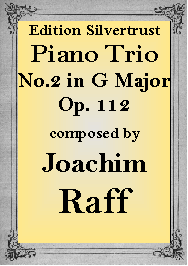Presents
Joachim Raff
Piano Trio No.2 in G Major, Op.112
 Raff's
Piano Trio No.2, which dates from 1863, was destined to take its place, along
with his other three piano trios, as among the most often performed during the
last half of the 19th century. Highly praised and a staple of the repertoire,
like the composer himself, it fell into oblivion after the First World War.
Raff's
Piano Trio No.2, which dates from 1863, was destined to take its place, along
with his other three piano trios, as among the most often performed during the
last half of the 19th century. Highly praised and a staple of the repertoire,
like the composer himself, it fell into oblivion after the First World War.
It seems virtually unimaginable that a composer whose talent was recognized and whose music was admired by Mendelssohn and Liszt, could become a mere footnote, yet this is what became of Raff and his music for most of the 20th century. Only now is he being rediscovered to the delight of those fortunate enough to hear his music. From 1860 to 1900 the name of Joachim Raff (1822-1882) was regularly mentioned in the same breath as Wagner, Liszt, and Brahms as one of Germany's leading composers. All of the critical commentaries which appeared during those years spoke of him as an equal to such masters as Mendelssohn, Schumann, Brahms, and Tchaikovsky. Incredibly, by the 1920's his music had all but disappeared from the concert stage.
Raff was born near Zurich and his family had hoped he would be come a school teacher, but music was his first love. Basically self-taught, Raff sent some of his early compositions to Mendelssohn who immediately recognized his talent and arranged for their publication. Unfortunately, Mendelssohn died before he could help Raff much more. The young composer then approached Liszt who also took an interest in him and took him on as his personal secretary and copyist. During the six years he spent with Liszt, Raff became a member of the so-called "New German School" led by Wagner and Liszt. Although he broke from them in 1856, he was still regarded as a Wagnerite by the supporters of Brahms and the other classicists. In short, Raff was in neither camp, but attacked by both. Isolated, he went his own way, paying little attention to the musical politics of late 19th century Germany.
But going his own way was hardly an easy proposition. Nearly starving, for many years Raff was forced to crank out compositions for the commercial market (works that would sell but were of little intrinsic or artistic merit), one after another as fast as he could. Sadly, this was later to tarnish his legacy. After his reputation had faded, he was regarded merely as a composer of parlor pieces, despite the magnificent symphonic and chamber works he left behind. Anyone who has had the time to hear these great works quickly realizes that Raff could be an impeccable craftsman when he had the luxury of time and was not forced to write for the home music-making marketplace.
The opening movement, marked Rasch, froh bewegt (Quick, happy and animated), is brimming with wonderful ideas and themes. The first subject is warm and yearning. The lovely second theme has an elegaic quality. The short second movement, Sehr rasch (very quick), is a somewhat spooky scherzo. The main theme lopes along but the accompaniment is a whirlwind background. The trio, still lively, has a more lyrical melody which is presented by the strings in echo format. The noble and solemn main theme to the slow movement, Mässig langsam (moderately slow), is introduced by the piano alone. A few variations follow. In the first, the strings embellish and develop the theme the piano has presented. A dramatic highpoint is reach in the tremendous stormy middle section which leads to a powerful ode of affirmation. (our sound-bite presents the theme, the first variation and the middle section.) The exciting finale, Rasch, durchaus belebt (Quick, lively throughout), starts with a bustling theme which quickly rises to a climax and then moves quickly forward. The development is in the form of a fugue. Suddenly, there is a Chinese-sounding interlude in the piano which heralds the return of the main theme.
This Trio, as far as we know, was only printed once and has been unavailable for at least 80 years if not longer. We have reprinted this edition but have added rehearsal numbers and corrected a few mistakes. We believe both professionals and amateurs alike will find this an important addition to their repertoires.
Parts: $29.95